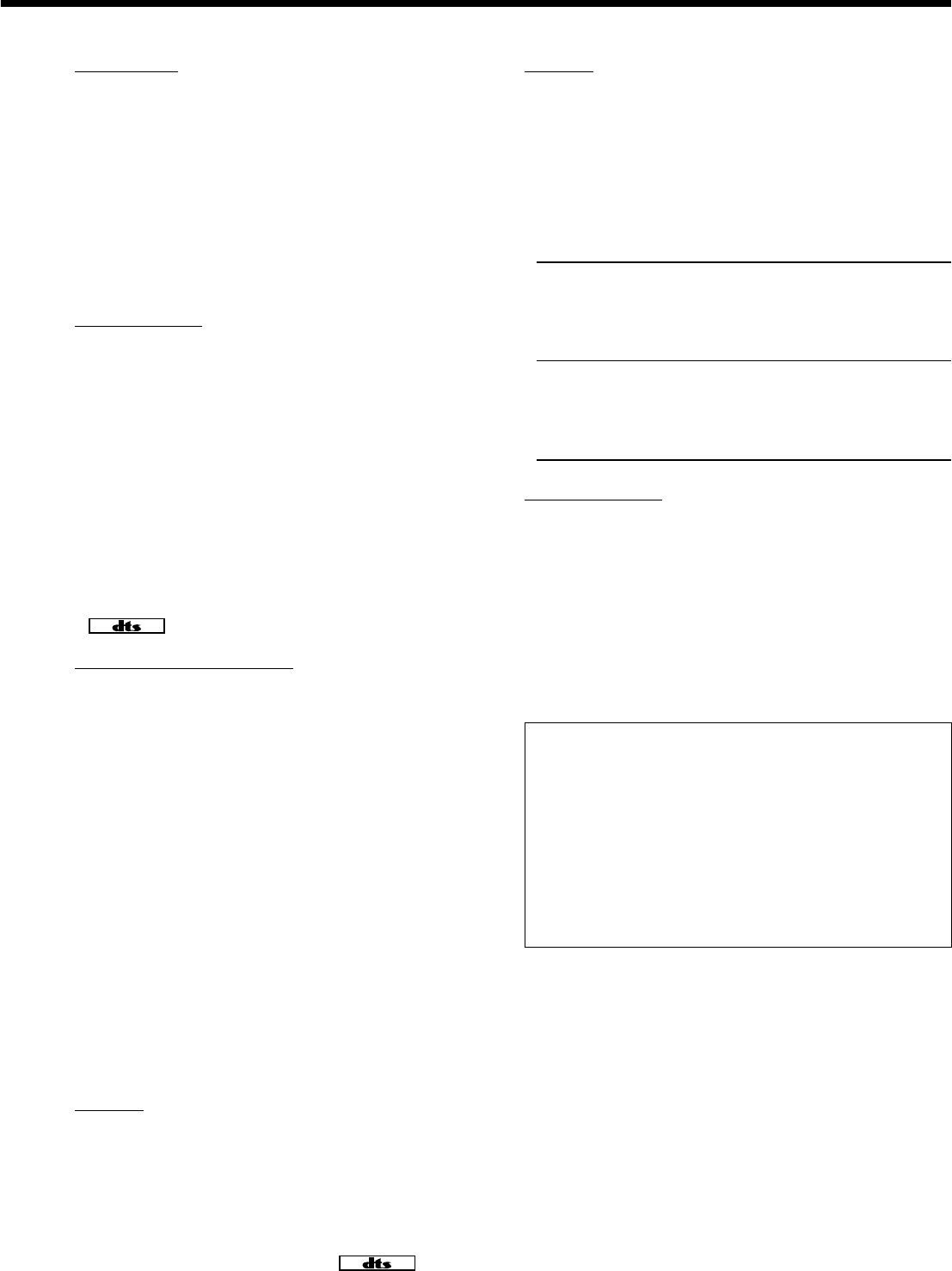
43
DTS Neo:6
DTS Neo:6 is another conversion method to create 6 channel (plus
subwoofer) from analog/digital 2-channel software by using the high
precision digital matrix decoder used for DTS-ES Matrix 6.1ch.
When one of Neo:6 modes is activated, the NEO:6 indicator lights
up on the display.
• This receiver provides the following DTS NEO:6 modes—Neo:6
Cinema (NEO:6CINMA) and Neo:6 Music (NEO:6MUSIC).
When DTS NEO:6 is activated, the NEO:6 indicator lights up on
the display.
NEO:6CINMA Suitable for playing movies. You can get the
same atmosphere with 2-channel software as
with 6.1-channel software. It is also effective for
playing software encoded with conventional
surround formats.
NEO:6MUSIC Suitable for playing music software. The front
channel signals bypass the decoder (resulting in
no loss of sound quality) and the surround
signals transmitted through the other speakers
expand the sound field naturally.
DTS Digital Surround
DTS Digital Surround (DTS) is another discrete 5.1-channel digital
audio format available on CD, LD, and DVD software.
Compared to Dolby Digital, the DTS Digital Surround format has a
lower audio compression rate which enables it to add breadth and
depth to the sounds reproduced. As such, DTS Digital Surround
features natural, solid, and clear sound.
• When EX/ES/PLIIx setting is set to “ON,” DTS plus Neo:6 (DTS
+ NEO:6) is applied while playing back multi-channel DTS
software. It creates the same surround ambience as 6.1-channel
software does.
Dolby Digital EX
Dolby Digital EX (DOLBY D EX) is a digital surround encoding
format that adds the third surround channels, called “surround back.”
Compared to the conventional Dolby Digital 5.1CH, these newly
added surround back channels can reproduce more detailed
movements behind you while viewing the video software. In
addition, surround sound localization will become more stable.
• You can use Virtual 6.1-channel surround when playing back Dolby
Digital EX software without connecting the surround back speakers.
This reproduces the back sound field as if the surround back speakers
exist, so that you can still feel the great surround effect from behind.
The VIRTUAL SB (Surround Back) indicator lights up on the display.
Dolby Digital 5.1CH
Dolby Digital 5.1CH (DOLBY D) encoding method records and
digitally compresses the left front channel, right front channel,
center channel, left surround channel, right surround channel, and
LFE channel signals.
Dolby Digital enables stereo surround sounds, and sets the cutoff
frequency of the surround treble at 20 kHz, compared to 7 kHz for
Dolby Pro Logic. As such, the sound movement and “being-there”
feeling are enhanced much more than Dolby Pro Logic.
DTS*
2
DTS is another digital signal compression method, developed by
Digital Theater Systems, Inc., and enables multi-channel encoding
and decoding (1ch up to 6.1ch).
• When DTS signal is detected through the digital input, the
indicator lights up on the display.
DTS Extended Surround (DTS-ES)
DTS-ES is another multi-channel digital encoding format.
It greatly improves the 360-degree surround impression and space
expression by adding the third surround channel—surround back
channel.
DTS-ES includes two signal formats with different surround signal
recording methods—DTS-ES Discrete 6.1ch (ES DSCRT) and
DTS-ES Matrix 6.1ch (ES MATRIX).
DTS-ES Discrete 6.1ch has been designed to encode (and decode)
a 6.1-channel signal discretely to avoid interference with each
channel.
DTS-ES Matrix 6.1ch has been designed to add an extra surround
channel to DTS Digital Surround 5.1 channel. By using a matrix
encoding/decoding method, an additional “surround back” channel
signal is encoded (and decoded) in both the left and right surround
channel signals.
• You can use Virtual 6.1-channel surround when playing back
DTS-ES software without connecting the surround back speakers.
This reproduces the back sound field as if the surround back
speakers exist, so that you can still feel the great surround effect
from behind.
The VIRTUAL SB (Surround Back) indicator lights up on the display.
DTS 96/24
In recent years, there has been increasing interest in higher sampling
rates both for recording and for reproducing at home. Higher
sampling rates allow wider frequency range and greater bit depths
provide extended dynamic range.
DTS 96/24 is a digital signal format (fs 96 kHz/24 bits) introduced
by Digital Theater Systems, Inc. to deliver “better-than-CD sound
quality” into the home.
• When DTS 96/24 signal is detected, the
and 96/24
indicators light up on the display. You can enjoy its sound with
full-quality.
*
1
Manufactured under license from Dolby Laboratories. “Dolby”, “Pro
Logic”, and the double-D symbol are trademarks of Dolby
Laboratories.
*
2
“DTS”, “DTS-ES”, “Neo:6” and “DTS 96/24” are trademarks of
Digital Theater Systems, Inc.
What is Dual Mono?
Dual Mono can be easily understood when you think of the
bilingual broadcast or the MTS (Multichannel Television Sound)
format used for TV programs (however, the Dual Mono format is
not identical with those analog formats).
This format is now adopted in Dolby Digital, DTS, and so on. It
allows two independent channels (called main channel and sub-
channel) to be recorded separately.
• When Dual Mono signal is detected, the DUAL indicator lights
up on the display. You can select either channel you want to
listen to (see page 36).
When using the Surround mode, the sounds come out of the
activated speakers which the Surround mode requires.
• If either the surround speakers or center speaker is set to
“NONE” in the speaker setting, the corresponding channel
signals are allocated to and emitted through the front speakers.
• If both the surround speakers and center speaker are set to
“NONE” in the speaker setting, JVC’s original 3D-PHONIC
processing (which has been developed to create the surround
effect through the front speakers only) is used. The 3D-PHONIC
indicator lights up on the display.


















